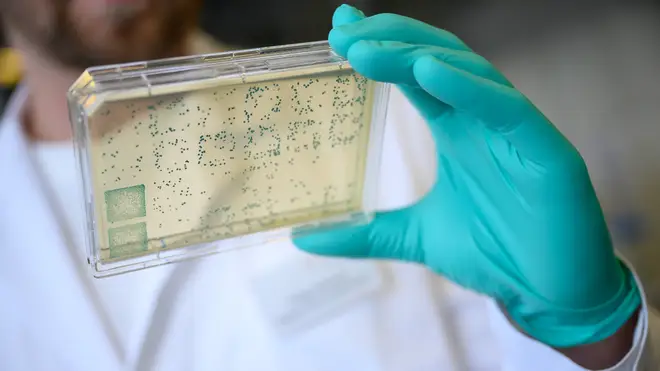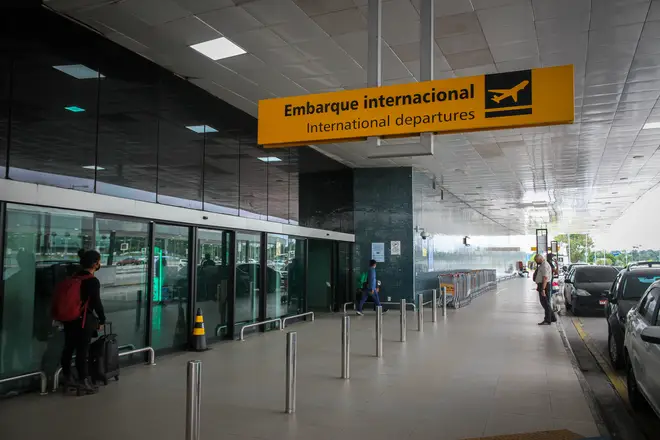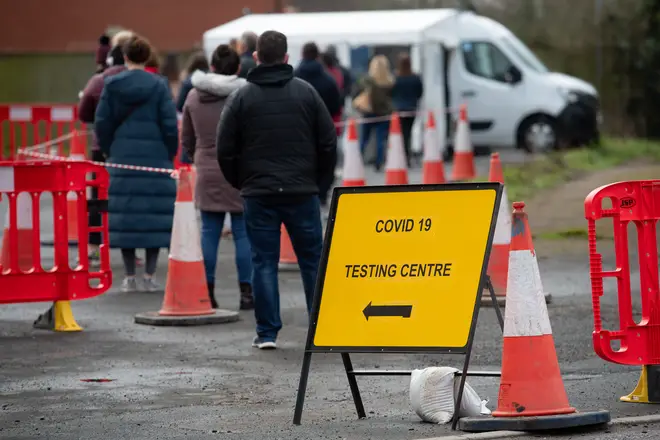
Iain Dale 7pm - 10pm
28 February 2021, 17:08 | Updated: 1 March 2021, 08:59

Six cases of a Brazil Covid-19 "variant of concern" have been detected in the UK, with a search now underway to track down one of these individuals, who has yet to be identified.
Public Health England said three cases of the P.1 Manaus variant had been found in England, with three more discovered in Scotland.
The variant is thought to spread more rapidly and could respond less well to existing vaccines, although more research is underway.
Vaccines Minister Nadhim Zahawi told LBC this morning that anyone who had a test on the 12th or 13th February and has not had their result back yet, call 119 today.
The first two cases of the variant have been found from one household in South Gloucestershire with a history of travel to Brazil.
Read more: ‘Strong evidence’ Covid vaccines reduce transmission expected soon, JCVI member tells LBC
One member of the household travelled back from the country in mid-February before the quarantine hotel policy was introduced. Others in the household then developed symptoms, officials said.
Passengers who landed in Heathrow on 10 February on the Swiss Air flight LX318 - from Sao Paulo, via Zurich - are also being contacted by NHS Test and Trace.
However, the whereabouts of the third individual in England is unknown, as PHE says the person did not complete their test registration card.

Officials are asking anyone who took a test on February 12 or 13 and who has not received a result or has an uncompleted test registration card to come forward immediately.
The unlocated case is not believed to be linked to the others because the virus was found to have slight genetic differences.
Read more: Rishi Sunak to offer £5bn 'restart' boost to help struggling businesses reopen
Surge testing is being deployed in parts of South Gloucestershire to rapidly test as many people as possible for the variant.
"Additional community testing, also known as surge testing, will follow the same process that was in place in parts of South Gloucestershire earlier this month," PHE and NHS officials said.
"It will invite residents who live in five postcode sectors, who are aged 16 and over and who are asymptomatic (without symptoms of Covid-19), to come forward for testing, as well as people who travel into that area for work or to visit someone they are in a support bubble with.
"The identified postcode areas fall within Bradley Stoke, Patchway and Little Stoke and are different to those that were part of the community surge testing programme which took place between February 7 and 21. There is no connection between the two programmes."
Read more: Over 20 million people given Covid vaccine in 'magnificent achievement' for the UK

In Scotland, the cases are linked to three people from the North East Grampain region, who returned from Brazil, via Paris and London in early February.
These three cases are not connected to those found in England, the Scottish government said.
Other passengers on the flight the infected individuals took from London to Aberdeen will be contacted by health protection teams, with all samples sequenced to determine if it is the new variant.
Explained: When are Scottish schools reopening?
Scottish Health Secretary Jeane Freeman said: “The identification of this new variant is a concern but we are taking every possible precaution.
"We have identified these cases thanks to our use of advanced sequencing capabilities which means we are finding more variants and mutations than many other countries and are therefore able to take action quickly."

JCVI member: Modified vaccines possible for vulnerable by October
The World Health Organisation has been informed of the cases, which has been designated "of concern" as it shares key mutations with the variant detected in South Africa.
Speaking to LBC, Dr Simon Clarke, professor of microbiology at the University of Reading said it was essential people cooperate with the surge testing, as "we really do need to get this under control".
"It is a potentially serious development, if it is allowed to spread and if people don't cooperate with the surge testing that will be going on in certain areas," he explained.
Dr Susan Hopkins, PHE's strategic response director for Covid-19, added: "We want to prevent the spread of this new variant in and around the country.
"We are concerned that this may have increased transmissibility, may lead to more infections and we don't yet know the vaccine effect. So we really want to prevent the spread in the UK population."
Read more: Rishi Sunak unveils £1.65bn boost for Covid-19 vaccine rollout ahead of Budget

However, NHS national medical director Stephen Powis said Covid-19 vaccines can be quickly adapted to tackle new strains following the emergence of the new variant.
Professor Powis told reporters: "The new vaccines which are being used for Covid can be adapted very rapidly so it's likely that if we do need to change the vaccine that can be done in months, rather than years, which was the case with the more traditional vaccines."
Read more: Over £66k in fines issued as SAGE expert issues warning over weekend crowds
Shadow home secretary Nick Thomas-Symonds said the incident is "deeply concerning" and provides "further proof" that the Government acted too late to introduces restrictions at the border.
He added: "It is now vital that we do everything we can to contain it.
"But this is further proof that the delay in introducing a hotel quarantine was reckless and the continuing refusal to put in place a comprehensive system leaves us exposed to mutations coming from overseas."